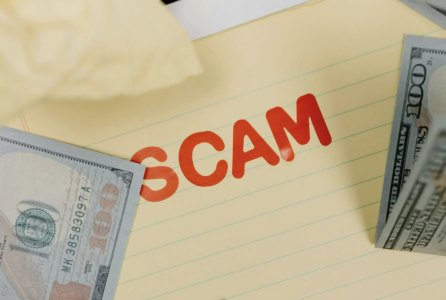Unwanted medical gear at your door? It could be a dangerous Medicare scam
By
Veronica E.
- Replies 0
If you're on Medicare—or have a loved one who is—there’s a troubling scam making its way into homes across the country.
Seniors are receiving medical equipment they never ordered, then being pressured to pay for it or unknowingly billed through Medicare.
It may seem like a harmless shipping mistake at first, but this scheme is causing real financial harm and draining critical Medicare resources.
The good news? With the right information, you can recognize the signs and protect yourself or someone you care about.
Here’s everything you need to know to stay ahead of the latest Medicare scam.

Picture this: a package arrives at your door containing a wheelchair, brace, or breathing device—none of which you ordered or discussed with your doctor.
While it might look like a shipping mix-up, it’s likely part of a scam.
Pennsylvania Attorney General Dave Sunday recently issued a public warning about this exact situation.
Scammers are sending unsolicited medical supplies to seniors, then fraudulently billing Medicare—or in some cases, sending you a confusing invoice and hoping you’ll pay up without question.
To make matters worse, some of these scammers follow up by phone, posing as Medicare representatives or medical suppliers.
They may pressure you to provide personal information, claim you owe money, or try to get you to authorize more charges.
This isn’t just an inconvenience.
When fraudsters bill Medicare for services or equipment you never agreed to, it drains funds from a system that millions of older Americans rely on.
It can also result in fraudulent entries on your Medicare history, which may impact your future care eligibility.
And because this scam often ramps up during Medicare Open Enrollment (October 15 to December 7), it’s easy to mistake these communications for legitimate offers or plan details.
Scammers are counting on that confusion.
Here are the red flags that could signal a scam:
If anything feels off, don’t ignore your gut—take steps to verify the situation.
Staying vigilant is the best defense. These simple actions can help you stay ahead of scammers:
If you’ve received equipment you didn’t request or suspect you’re being scammed:
Scammers often target seniors because they know how vital Medicare is—and they’re hoping to catch people off guard.
But older adults are also some of the most proactive and informed members of our community.
By staying alert, talking with others, and reporting anything suspicious, you help protect not only yourself but also your neighbors and friends.
Read next:

Have you or someone you know received medical equipment you didn’t ask for? How do you stay on top of scams targeting older adults? Share your experiences and tips below—we’d love to hear from you.
Seniors are receiving medical equipment they never ordered, then being pressured to pay for it or unknowingly billed through Medicare.
It may seem like a harmless shipping mistake at first, but this scheme is causing real financial harm and draining critical Medicare resources.
The good news? With the right information, you can recognize the signs and protect yourself or someone you care about.
Here’s everything you need to know to stay ahead of the latest Medicare scam.

Some Medicare scams start with an unexpected package—don’t ignore it. Image Source: YouTube / Tara Winstead.
What’s happening: Medical equipment shows up uninvited
Picture this: a package arrives at your door containing a wheelchair, brace, or breathing device—none of which you ordered or discussed with your doctor.
While it might look like a shipping mix-up, it’s likely part of a scam.
Pennsylvania Attorney General Dave Sunday recently issued a public warning about this exact situation.
Scammers are sending unsolicited medical supplies to seniors, then fraudulently billing Medicare—or in some cases, sending you a confusing invoice and hoping you’ll pay up without question.
To make matters worse, some of these scammers follow up by phone, posing as Medicare representatives or medical suppliers.
They may pressure you to provide personal information, claim you owe money, or try to get you to authorize more charges.
Also read: Medicare scams are spreading fast—here’s how to protect your benefits before fraudsters strike
Why this scam is especially harmful
This isn’t just an inconvenience.
When fraudsters bill Medicare for services or equipment you never agreed to, it drains funds from a system that millions of older Americans rely on.
It can also result in fraudulent entries on your Medicare history, which may impact your future care eligibility.
And because this scam often ramps up during Medicare Open Enrollment (October 15 to December 7), it’s easy to mistake these communications for legitimate offers or plan details.
Scammers are counting on that confusion.
Also read: A new phone scam is targeting seniors with fake health insurance deals—here’s what to know before you pick up
Warning signs to look out for
Here are the red flags that could signal a scam:
- Unsolicited medical devices: You receive equipment you never ordered or discussed with your doctor.
- Bills from unfamiliar companies: Any charge you don’t recognize is a reason to investigate.
- Unexpected phone calls: Someone posing as a Medicare rep asks for your Social Security or Medicare number.
- High-pressure tactics: They insist you act quickly, threaten coverage loss, or push you to pay immediately.
If anything feels off, don’t ignore your gut—take steps to verify the situation.
Also read: How a $50K scam fooled a finance expert—and what it means for the rest of us
What you can do to protect yourself
Staying vigilant is the best defense. These simple actions can help you stay ahead of scammers:
- Review your Medicare statements
Go over your Medicare Summary Notices (MSNs) or Explanation of Benefits (EOBs) regularly. Look closely for any charges you don’t recognize. If something seems suspicious, call Medicare directly at 1-800-MEDICARE (1-800-633-4227). - Report unrequested equipment
If you receive a package you didn’t order, don’t throw it away—report it. In Pennsylvania, you can contact the Attorney General’s Health Care Section at 877-888-4877. Other states have similar reporting options through their official websites. - Never pay unfamiliar medical bills
Don’t pay for services or items unless you’ve spoken to your doctor and can verify the charges. When in doubt, call your doctor’s office for confirmation. - Keep personal details private
Never share your Medicare number, Social Security number, or any financial info with someone who contacts you unexpectedly—whether by phone, email, or even in person. - Hang up on suspicious calls
Medicare will never call you to sell something or ask for personal details. If you receive a call that feels off, hang up and call Medicare yourself to verify.
Also read: Seniors, beware—your online safety could be at risk if you ignore this critical advice
Already targeted? Here’s what to do next
If you’ve received equipment you didn’t request or suspect you’re being scammed:
- Contact Medicare at 1-800-MEDICARE to report what happened and get next steps.
- Reach out to your state attorney general. Each state has a dedicated office for consumer protection and healthcare fraud. You can find the contact info on your state’s government website.
- Tell your doctor. Your healthcare provider can help identify suspicious claims and ensure nothing inappropriate has been billed under your name.
Why seniors are targeted—and how to fight back
Scammers often target seniors because they know how vital Medicare is—and they’re hoping to catch people off guard.
But older adults are also some of the most proactive and informed members of our community.
By staying alert, talking with others, and reporting anything suspicious, you help protect not only yourself but also your neighbors and friends.
Read next:
- A new Social Security email scam is hitting seniors—here’s what the SSA says to protect yourself and your loved ones
- Protect your retirement! Beware of these 6 Social Security scams on the rise in 2025
- BEWARE: This fraud scheme could put your Social Security at risk
Key Takeaways
- A growing Medicare scam involves sending seniors medical equipment they didn’t order, then billing them or Medicare fraudulently.
- Seniors are advised to check their Medicare statements carefully and report any unfamiliar charges or unsolicited deliveries.
- You should never pay for equipment or services you didn’t request or discuss with your doctor.
- Personal information—like your Medicare or Social Security number—should never be shared with unknown callers or unexpected contacts.
Have you or someone you know received medical equipment you didn’t ask for? How do you stay on top of scams targeting older adults? Share your experiences and tips below—we’d love to hear from you.






